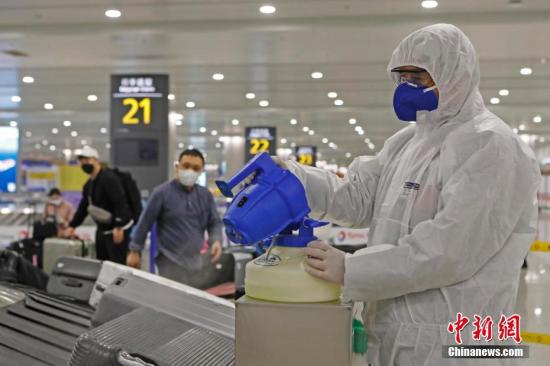(Countering new crown pneumonia) Overseas input raises alarm for China's war epidemic from "internal control" to "foreign defense"
China News Service, Beijing, March 17th: Overseas input raises alarm for China's war epidemic from "internal control" to "foreign defense"
China News Agency reporter Wang Zumin
The data released by the National Health and Medical Commission of China on the 17th showed that 21 new cases were confirmed nationwide on the 16th, with the exception of Wuhan City 1 and the remaining 20 cases were all imported from abroad. Under the situation that the domestic epidemic situation is effectively controlled, overseas imports have once again triggered China's epidemic prevention and control alarm.
Data map: Staff disinfects the luggage of incoming passengers. Photo by China Press Agency reporter Yin Liqin
Overseas importation becomes the main body of epidemic increase
As of 24:00 on the 16th, China had accumulated 143 imported cases abroad. On the 16th, overseas imported cases were reported for the first time in Guangxi and Shaanxi. So far, more than ten provinces including Ningxia, Gansu, Beijing, Shanghai, Zhejiang, Guangdong, Henan, Shandong, Yunnan, Guangxi, and Shaanxi have been “listed”. Among them, Gansu has 42 cases, the provinces with the largest number of imported cases abroad, followed by Beijing and Shanghai, with a cumulative total of 40 and 20 cases, respectively. Beijing and Shanghai have experienced imported cases for 5 consecutive days.
Iran and Italy, which are in high prevalence, have become the main source countries of imported cases outside China. According to the current known cases, there are confirmed cases imported from Britain, Spain, France, Switzerland, the United States, Thailand, the Philippines, and Indonesia.
Since the National Health Commission first included overseas imported cases into the epidemic data statistics on March 5, overseas imported cases have been increasing for 13 consecutive days, and it has surpassed local new cases for 4 consecutive days, becoming the main body of China's recent increase in confirmed cases. Preventing the spread or even the risk of epidemics brought by overseas imports has become the primary task of China's current epidemic prevention and control.
Air, sea and air defense joint control strictly observes entry barriers
Faced with the continued spread of the global epidemic and the escalating pressure from overseas imports, China has strictly controlled entry points while doing a good job in domestic epidemic prevention and control.
The State Administration of Migration has established the “pre-knowledge” of boarding, taking off, and entry through the established joint prevention and control mechanism, and promptly and proactively sends the entry-exit information of personnel to relevant departments such as customs and quarantine and local government departments, Competent agency pushes; CAAC comprehensively scores flight operation risks, adopts different prevention and control measures according to different levels of high, medium, and low risks; the Ministry of Transport sorts out immigrants and adopts a "point-to-point, one-stop" mode of transportation. Ship it directly from the port of entry to the destination city; the relevant person in charge of the General Administration of Customs made it clear that with luck, to evade customs quarantine, not only has to accept the condemnation of the public, but also faces the disaster of prison ...
From March 4th to 16th, the Civil Aviation Administration carried out a total of 13 missions to severely affected countries, of which 7 temporary flights took back 1,101 Chinese citizens.
The Supreme People's Court, the Supreme People's Procuratorate, the Ministry of Public Security, the Ministry of Justice and the General Administration of Customs have jointly issued a document demanding that the frontier health quarantine work be further strengthened, and that criminal acts that hinder frontier health quarantine be punished according to law.
Everywhere is strictly guarded against stubbornness and cuts off overseas imported infection chains
Beijing, which is under the most pressure from overseas, has recently issued a number of "entry orders" to prevent the capital from entering the country.
From March 10, Beijing Capital International Airport officially opened Terminal D area 3 as a special treatment area to receive inbound flights from countries and regions with severe epidemics. Subsequently, all international inbound flights from Beijing Daxing International Airport were transferred to the capital. Airport operation. On the 15th, Beijing issued new regulations. Starting at 00:00 on the 16th, all personnel entering the country (including asymptomatic persons) should be transferred to centralized observation points for 14 days of quarantine observation. On the 16th, a meeting was held in Beijing to require strict management of business jets entering Beijing. Immigrants misrepresented those who were concealed by the law while being included in the credit management system.
Shanghai implemented a "seamless connection" transshipment to ensure that visitors from key countries and regions of the epidemic did not contact the public from "landing to isolation", forming a "closed loop management" from the airport to the community. At the same time, Shanghai medical experts connected overseas Chinese and the front line of the epidemic to share the "China plan", reducing pressure from the "source". Various other places have also introduced a number of strict measures to cut off the infection chain of overseas imports.
Nowadays, the situation of China's epidemic prevention and control continues to improve, but as the number of imported cases continues to increase, China's war epidemic is "internally controlling" and it is increasing its "foreign prevention". Some experts said that overseas input is like a "second pass over grassland" for China's epidemic prevention and control, but supported by Chinese experience, a public hospital network and China's rapid control system for known infectious diseases reported by the CDC. The "grassland" will surely succeed. (Finish)

